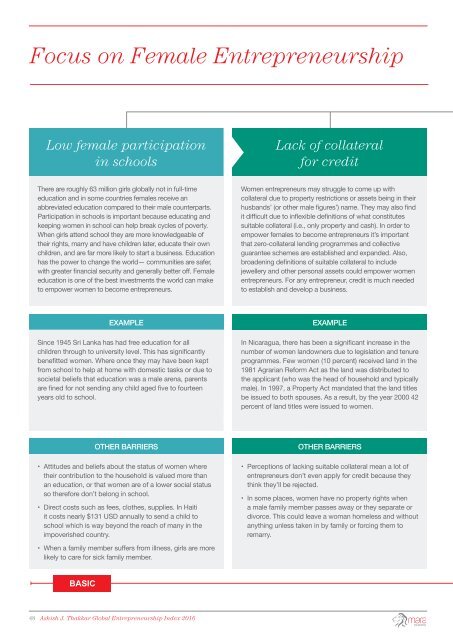About Mara Foundation Rona Kotecha
2iR5egf
2iR5egf
Create successful ePaper yourself
Turn your PDF publications into a flip-book with our unique Google optimized e-Paper software.
Focus on Female Entrepreneurship<br />
Low female participation<br />
in schools<br />
Lack of collateral<br />
for credit<br />
There are roughly 63 million girls globally not in full-time<br />
education and in some countries females receive an<br />
abbreviated education compared to their male counterparts.<br />
Participation in schools is important because educating and<br />
keeping women in school can help break cycles of poverty.<br />
When girls attend school they are more knowledgeable of<br />
their rights, marry and have children later, educate their own<br />
children, and are far more likely to start a business. Education<br />
has the power to change the world— communities are safer,<br />
with greater financial security and generally better off. Female<br />
education is one of the best investments the world can make<br />
to empower women to become entrepreneurs.<br />
Women entrepreneurs may struggle to come up with<br />
collateral due to property restrictions or assets being in their<br />
husbands’ (or other male figures’) name. They may also find<br />
it difficult due to inflexible definitions of what constitutes<br />
suitable collateral (i.e., only property and cash). In order to<br />
empower females to become entrepreneurs it’s important<br />
that zero-collateral lending programmes and collective<br />
guarantee schemes are established and expanded. Also,<br />
broadening definitions of suitable collateral to include<br />
jewellery and other personal assets could empower women<br />
entrepreneurs. For any entrepreneur, credit is much needed<br />
to establish and develop a business.<br />
EXAMPLE<br />
Since 1945 Sri Lanka has had free education for all<br />
children through to university level. This has significantly<br />
benefitted women. Where once they may have been kept<br />
from school to help at home with domestic tasks or due to<br />
societal beliefs that education was a male arena, parents<br />
are fined for not sending any child aged five to fourteen<br />
years old to school.<br />
EXAMPLE<br />
In Nicaragua, there has been a significant increase in the<br />
number of women landowners due to legislation and tenure<br />
programmes. Few women (10 percent) received land in the<br />
1981 Agrarian Reform Act as the land was distributed to<br />
the applicant (who was the head of household and typically<br />
male). In 1997, a Property Act mandated that the land titles<br />
be issued to both spouses. As a result, by the year 2000 42<br />
percent of land titles were issued to women.<br />
OTHER BARRIERS<br />
• Attitudes and beliefs about the status of women where<br />
their contribution to the household is valued more than<br />
an education, or that women are of a lower social status<br />
so therefore don’t belong in school.<br />
• Direct costs such as fees, clothes, supplies. In Haiti<br />
it costs nearly $131 USD annually to send a child to<br />
school which is way beyond the reach of many in the<br />
impoverished country.<br />
OTHER BARRIERS<br />
• Perceptions of lacking suitable collateral mean a lot of<br />
entrepreneurs don’t even apply for credit because they<br />
think they’ll be rejected.<br />
• In some places, women have no property rights when<br />
a male family member passes away or they separate or<br />
divorce. This could leave a woman homeless and without<br />
anything unless taken in by family or forcing them to<br />
remarry.<br />
• When a family member suffers from illness, girls are more<br />
likely to care for sick family member.<br />
BASIC<br />
48 Ashish J. Thakkar Global Entrepreneurship Index 2016


